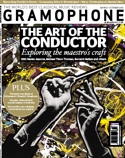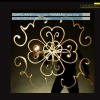Texte paru dans: / Appeared in:
*

GRAMOPHONE (10/2012)
Pour s'abonner /
Subscription information
Ambronay
AMY032

3760135100323
Consultez toutes les évaluations recensées pour ce cd
~~~~ Reach all the evaluations located for this CD
Reviewer: Philip
Kennicott
Les Talens Lyriques’ Rousset plays a 1716 Donzelague
It was Louis Marchand who fled the abortive 1717 keyboard duel with Bach in Dresden. If contemporary accounts hold water – and some scholars doubt them – the duel was organised as comeuppance for the ‘haughty’ Marchand, who, having surreptitiously listened to Bach beforehand, was affrighted into a hasty departure.
The only reason to retail an old and possibly dubious story is that such tales can cast a long shadow, even over performance decisions. One will hear nothing remotely haughty or grand in Christophe Rousset’s account of Marchand’s First and Second Books of harpsichord pieces, paired with Rameau’s grave and wonderful Suite in A from 1706. Compared to Rousset’s earlier recordings of Couperin, his Marchand is almost austere, more about threading the line than embellishing it.
But almost everything on this intriguing disc seems to flow from the choice of instrument, the five-octave harpsichord dated to 1716 by the Lyonnaise maker Pierre Donzelague. Rameau was in Lyons between 1713 and 1715, and became friends with Donzelague, so there is a plausible historical connection between this forward-looking instrument of uncommonly wide compass and the later Rameau works published in the 1720s.
The Donzelague’s tone quality is remarkable, nasal and thin, without the robust middle and round bass tones one hears in Davitt Moroney’s recording of Marchand. It is more urgent than elegant, yet remarkably alert and precise. Everything becomes crisper, both in the instrument’s tone production and in Rousset’s response to the instrument’s inherent virtues. There are times when the results are almost illusionistic, as in the Courante of the Second Book, where a sustained tonic tone in the left hand gives the impression of a vigorous musette-style drone.
Rousset’s reading is tightly wound, uncommonly so for this player. Ornaments are snapped and inégalité is subtle to the point of being more a matter of impression than discernible gesture. The Rameau suite is dry, almost skeletal, but with the compensating virtues of an X-ray.
Marchand has received his due
before – from Moroney, Blandine Verlet, Andrew Appel and others. Rousset’s
understanding of the music – brittle, tense, forward-thrusting – stands apart,
though not entirely convincingly. There is more warmth and ease to be found
here.
Cliquez l'un ou l'autre
bouton pour découvrir bien d'autres critiques de CD
Click either button for many other reviews


